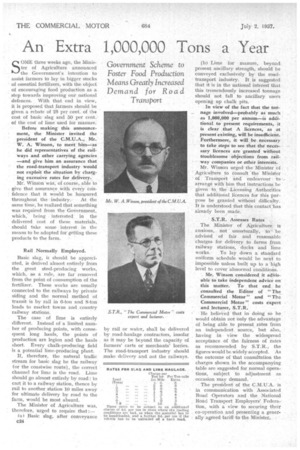An Extra 1,000,000 Tons a Year
Page 70

If you've noticed an error in this article please click here to report it so we can fix it.
Government Scheme to Foster Food Production Means Greatly Increased Demand for Road Transport
SOME three weeks ago, the Minister of Agriculture announced the Government's intention to assist farmers to lay in bigger stocks of essential fertilizers, with the object
of encouraging food production as a step towards improving our national defences. With that end in view, it is proposed that farmers should be given a rebate of 25 per cent, of the cost of basicslag and 50 per cent.
of the cost of lime used for manure. Before making this announcement, the Minister invited the president of the C.M.U.A., Mr. W. A. Winson, to meet him—as he did representatives of the railways and other carrying agencies —and give him an assurance that the road-transport industry would not exploit the situation by charging excessive rates for delivery.. Mr. Winson was, of course, able to give that assurance With every co-n
ficlence that it would be honoured throughout the -induStry. At the same time, he realized that something was required from the Government, which,' being interested in the delivered cost of these materials, • should take some interest in the means to be adopted for getting these products to the farm.
Rail Normally Employed.
Basic slag, it should be appreciated, is derived almost entirely from the great steel-producing works, which, as a rule, are far removed from the point of consumption of the fertilizer. These works are usually connected to the railways by private siding and the normal method of transit is by rail in 43-ton and 8-ton loads to market towns and country railway stations.
The case • of lime is entirely different. Instead of a limited number of producing points, with consequent long hauls, the points of production are legion and the hauls short. Every chalk-producing field is a potential lime-producing plant.
If, therefore, the natural traffic stream for basic slag be the railway (or the coastwise route), the correct channel for lime is the road. Lime should go almost entirely by road : to cart it to a railway station, thence by rail to another station 10 miles away for ultimate delivery by road to the farm, would be most absurd.
The Minister of Agriculture was, therefore, urged to require that
(a) Basic slag, after conveyance c24
by rail or water, shall be delivered by road-haulage contractors, insofar as it may be beyond the capacity of farmers' carts or merchants' lorries. The road-transport industry should make delivery and not the railways.
(b) Lime for manure, beyond present ancillary strength, should be conveyed exclusively by the roadtranspOrt industry. It .is suggested that it is in the national interest that this tremendously increased tonnage should not fall to ancillary users opening up chalk pits.
In view of the fact that the tonnage involved—probably as much as 1,000,000 per annum—is additional to present requirements, it is clear that A licences, as at present existing, will be insufficient. Furthermore, it will be necessary to take steps to see that the necessary licences are granted without troublesome objections from railway companies or other interests. Mr. Winson urged the Minister of " Agriculture to consult the Minister of • Transport and endeavour to arrange with him that instructions be given to the Licensing Authorities that additional licences for this pur pose be granted without difficulty.
It is understood that this contact has
already been .made.
S.T.R. Assesses Rates The Minister of Agriculture is anxious, not unnaturally, to be advised of fair and reasonable charges for delivery to farms from railway stations, docks and lime works. To lay down a standard uniform schedule would be next to impossible unless built up to a -high level to cover 'abnormal conditions. Mr. Winson considered it advisable to take independent advice on this matter. To that end, he consulted the Editor of "The Commercial • Motor" and "The Commercial Motor ". costs expert and lecturer, S.T.R.
He believed that in doing so he would obtain not only the advantage of being able to present rates from an independent source, but also, having in view the widespread acceptance of the fairness of rates as recommended by S.T.R., the figures would be widely aecepted. As the outcome of that consultation the charges shown in the accompanying table are suggested for normal operations, subject to adjustment as occasion may demand.
The president of the C.M.I.J.A. is in communication with Associated Road Operators and the National Road Transport Employers' Federation, with a view to securing their co-operation and presenting a generally agreed tariff to the Minister.




















































































































































